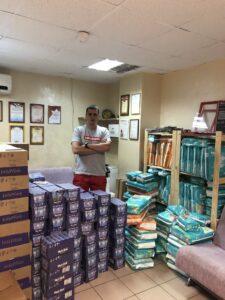The project “Provision of prompt assistance to women living with HIV and their children in Nizhny Novgorod region”, supported by the Emergency Support Fund for Key Populations in the EECA region in 2020, was continued in 2021 with the financial support of the Presidential Grants Fund of the Russian Federation.
Egor Sekretov, manager of the STEP Charity Foundation, which implements the project together with the partner NGO “Right to Life”, shared with us the problems that they managed to solve with the help of the Emergency Support Fund, their main successes, as well as results that had been unplanned, but very important.
 Why did you decide to apply to the Emergency Support Fund?
Why did you decide to apply to the Emergency Support Fund?
STEP Charity Foundation has been actively working with all key populations for over 5 years. Due to the aggravated epidemiological situation in the Nizhny Novgorod region because of the COVID-19 world pandemic, starting with March 2020 we began to receive calls for help from our clients (women living with HIV) to buy formula milk and essential things.
This caused us a well-founded fear of the possibility of increased cases of vertical transmission of HIV from mother to child in the Nizhny Novgorod region. According to the research that later confirmed our concerns, people living with HIV are among the most vulnerable KPs during the global COVID-19 pandemic.
We started to look for funding – this should have been a grant or subsidies, which, firstly, should have been prompt (quick actions had to be taken at once), secondly, big enough to alleviate financial burden for women living with HIV and raising babies aged 0 to 1 year old.
We follow inspiringly the work of AFEW International in the EECA region, as well as collaborate with the AIDS Foundation East-West Russian office in our project activities in the region. The decision to write to the Emergency Fund came immediately, since the very format of providing assistance, submitting an application and all communications are as comfortable as possible for non-profit organizations and initiative groups.
What made the situation so urgent?
According to the information newsletter of the Nizhny Novgorod Regional AIDS Center, 156 children were born to women living with HIV in the Nizhny Novgorod region in the first half of 2020 alone. The total share of women living with HIV in the Nizhny Novgorod region is 35.2% of the total number of registered people (about 10,000 people).
One of the barriers women living with HIV faced was reduction of income due to the pandemic, including loss of jobs without any compensation payments. Buying formula regularly has become intolerable burden for the family budgets.
Another barrier – limitations of transportation due to quarantine measures. Many governmental establishments switched to distant service format, and it created a very long queue of people wanting to order the service of gathering necessary documents to confirm their low-income status. In Nizhny Novgorod region you have to confirm your low-income status with a number of documents in order to be eligible to receive compensation to buy formula milk, and gathering these documents has become a huge ordeal for recently delivered mothers. Limitations of transportation also dramatically influenced the accessibility of ARV therapy medicines.
As a result, women living with HIV and raising infant babies in Nizhny Novgorod region found themselves in a situation of colossal danger: commitment to ARV treatment weakened, the risk of breast-feeding and vertical HIV transmission backed up by the absence of money to buy formula became possible.
 What were your goals and did you succeed in achieving them?
What were your goals and did you succeed in achieving them?
The first goal: to stop transmission of HIV from mother to child through the breast milk in Nizhny Novgorod region.
The second goal: to prevent decrease of commitment to ART in women living with HIV in Nizhniy Novgorod region.
The third goal: to enlarge the community of women living with HIV and to enhance sustainability of this community on the territory of the Nizhny Novgorod region.
In the process of implementation we have added a few more goals to this list. We wanted to reach the maximum number of women living with HIV and raising babies aged 0 to 1 year old in Nizhny Novgorod region, and we have designed a system of distribution of humanitarian aid.
The system we designed consisted in printing out vouchers with individual numbers for humanitarian aid and giving them to the Nizhny Novgorod Regional AIDS Center (it is the place where all PLHIV receive ART medicines and undergo medical evaluations, including women with children). According to the internal protocols of the Center, women living with HIV who deliver babies, are obliged to visit pediatrician and conduct HIV screening for their children for at least one year. Therefore, when women visited the Center they received both the core services plus our voucher and a consultation with our peer consultant and a package of humanitarian aid. Therefore we added new goals: to reduce the number of missed screenings both for women living with HIV and their babies aged 0 to 1 y.o., and also to return women living with HIV who dropped out of treatment back into the regimen.
In simple words it looked like this:
- Hi, good afternoon, is it STEP Foundation?
- Can we get diapers and formula?
- Yes, go to the AIDS prevention center, they will give you a voucher, and then come back to us with this voucher.
Assisted by the Foundation staff, we plan the next visit to the pediatrician.
Thanks to the Emergency Support Fund, we reached out to 80 women living with HIV who have babies aged 0-1 years old – they received direct material support. 16 women received assistance via consultations on receiving governmental subsidies for the purchase (distribution) of formula.
We were able to return 8 women back to ARV treatment and to enhance adherence to treatment in other women, because all of them visited consultations provided by our peer consultant.
Additionally, while running this project we were able to identify the main reason of ART rejection: psychological fear of taking ARV medicines, fear of side effects associated with ARV therapy, low awareness of the course of HIV infection and of the consequences of late initiation of ARV therapy (for example, developing the immune reconstitution inflammatory syndrome), self-stigmatisation and fear of disclosing the disease to close people, as well as postpartum depression.
What were the unexpected, unplanned outcomes and peculiarities of the project?
Unexpected outcomes include completing tasks that were not related to the main goal of the project. Some of the clients who turned to our Foundation for help also received consultations from specialists on the prevention of the use of narcotics and psychotropic drugs.
For example, at one of the consultations we found out that a women living with HIV and raising two children was also a drug-addict. Social workers of our Foundation referred her to the Social Rehabilitation Center for addicts established under the Ministry of Health of Nizhny Novgorod region. This project literary saved her life, when she came to get humanitarian aid. She is now undergoing social and psychological rehabilitation after using narcotics.
Another outcome that we did not expect was consulting a woman in a situation of domestic violence. This woman now uses the services of a charity foundation that works with the problem of domestic violence in our region.
Two women from our target group addressed the Foundation reporting health problems caused by ART cancellation. They received consultations regarding adherence to treatment, today they are provided with the necessary medicines and started treatment again, they are under social observation of the STEP Foundation’s specialists.
What’s more, during the project’s implementation, the formula supplier increased the number of packages free of charge, and it allowed us to give prompt help to women in excess of the budget and to continue implementation even after we reached the project’s target indicators.
We received gratitude from the pediatrics staff of the Nizhny Novgorod Regional AIDS Center. The formula vouchers were distributed via pediatricians’ offices of the Center and it allowed doctors to establish additional control over the families that tend to drop out from D-observation.
Does your organization run any advocacy activities? Did the grant expand the advocacy focus?
Yes, we do, we provide legal support to people living with HIV. We have a consultant who provides counselling on legal matters related to HIV – Alyona Tarasova. By the way, within the framework of this project, we have taken a case of adoptive parents who adopted children living with HIV and who are unable to receive disability status for these kids and subsidies promised by the state. The case is now in work.
After receiving the second tranche of the emergency support, we initiated a research of barriers in access to breast milk substitutes in the target group of the project in Nizhny Novgorod region. The sample estimates 83 women. At this moment, we are processing the research data and will continue further advocacy activities based on the research results.
In your report you mention outstanding effectiveness of the project in the context of expanding the community in Nizhny Novgorod region.
In addition to targeted support, we were able to expand the Nizhny Novgorod community of women living with HIV (who actively communicate via Viber channel created for them) from 20 to 73 people as of today. This growth was achieved very quickly, and this is extraordinary success for our region, because it opens up new perspectives for prevention activities, support of women’s activism and our clients’ rights protection.
How did this grant influence the development of your organisation?
The project on the provision of emergency support became the basis of the “Commitment” Project, which received support from the Presidential Grants Fund (application No. 21-1-002469) in February 2021, thereby boosting the project with lectures on prevention and informational activities by doctors, psychologists, peer consultants, and social workers.
The project budget has been increased by more than 100%. Per our estimates, the provision of formula and humanitarian packages will continue until May 2021 according to the scheme developed under the project supported by the Emergency Support Fund.



